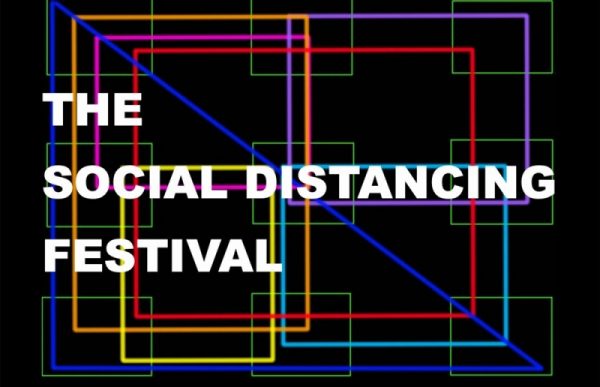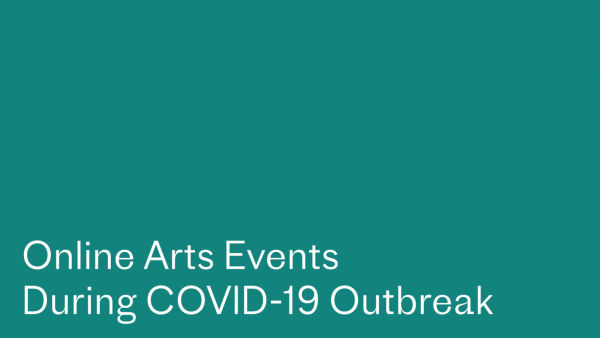Arts Commentary: COVID-19 and the Desperation of Dumping Art
By Jeff Zinn
There’s a story yet to be written about art dumping; theater and dance dumping; even film and TV dumping now that live performance and production of all kinds has shut down.

In the April 12 edition, the NY Times leads with Trump’s well-documented failure to heed warnings on the threat of COVID-19. Also, on page one above the fold, a story about farmers dumping crops due to lessened demand with closure of restaurants and schools. It struck me that there’s another story to be written about art dumping; theater and dance dumping; even film and TV dumping now that live performance and production of all kinds has shut down. In Boston and all over the country there are performing artists, technicians, and support staff essentially dumping their talent and creativity. Some are dumping it into YouTube, Facebook, Instagram and Zoom. No one is getting paid for any of that but it’s something like the crops: it’s been planted, and it’s grown (we can’t help it) and now it has to go somewhere.
A letter I wrote our MA Senators as the relief bill was being negotiated a couple of weeks ago:
I’ve spent thirty years in Massachusetts running small but vibrant theater companies. It has been horrifying to witness the overnight obliteration of my colleagues’ busy careers. All of them – the talented actors, directors, stage managers, designers and technicians – are freelancers, moving from show to show and dependent on the small companies who consistently hire them. I am retired now, but they are out of work. All of them. As independent contractors, they have no claim on unemployment benefits. The companies that have been forced to close productions and cancel seasons are also in mortal peril. If they go under there will be no jobs to go back to and, by the way, much less culture for our communities. Both ends of this food chain need help.
Since then a lot has happened though not much has really changed. The Senate passed its $2 trillion “rescue” package, predictably riddled with holes and inadequacies. In a brief aside, Mnuchin (I think) dared to preemptively gloat about how much better this rollout, this website would be than Obamacare (remember the absolute SCANDAL of the ACA website straining for a few days to keep up with demand? Good times!) The checks going out for $1200 or $2400 or $600, even if some manage to land in the mailboxes or bank accounts of the freelancers mentioned above, will not be enough to plug more than the tiniest holes in people’s needs. Nor will help arrive in time for Gloucester Stage or Harbor Stage, New Rep, Speakeasy, Gamm, Central Square, etc. but that is probably the least of our problems.
Summer theaters, like Gloucester Stage, are surely the most vulnerable. A normal mid-May opening means planning and logistics are happening now. Still, some are taking a damn-the-torpedoes approach, moving forward with their announced seasons while hedging bets somewhat: “In the event of a production being cancelled, ticket holders will be notified at least 1 month prior to the opening date.” (Gloucester) Many year-round theaters have postponed until the fall. And while the theaters that normally follow an academic-year schedule would seem to have more breathing room, New Rep’s website states, “The aforementioned [postponed] productions, tours, and Gala comprise 22% of our operating budget, and a potentially devastating loss of nearly $370,000 this fiscal year.” As for the big guns, the ART website, aside from a modest “Postponed” tag next to its “1776 Salon” event, is curiously silent on the broader question. The Huntington has postponed: “After much careful consideration regarding the coronavirus pandemic, the Huntington Theatre Company’s production of The Bluest Eye will move to a future season; Our Daughters, Like Pillars will now be part of the 20/21 subscription season. LEARN MORE.” Arts Emerson lists a shocking succession of “CANCELLED” events previously scheduled, but boldly leads with “Together Apart – Explore New Worlds From Your Home.” Which brings us to the tricky subject of moving theater into the realm of the small screen, online streaming, Zoom, and YouTube.
Some are picking up on the sense of desperation inherent in theater artists turning to their cellphones to record monologues, or virtual play readings. I urge you to read the very thoughtful and thorough survey of the pandemic’s effect on the theater industry as a whole in a recent American Theatre piece, “No Show” by Rob Weinert-Kendt, in which he quotes Kathryn M. Lipuma, executive director of Writers Theatre, who says, “Film can’t do what we do, and film people do what they do better than we can.” We will try though. Saturday Night Live pulled off a pretty good Zoom show a couple of nights ago, but of course they have some help.

We theater people tend to get precious about the importance — the liveness — of live theater; the specialness of performers and audience all breathing the same air (yikes), occupying the same moment in time in the same space. All true. And yet we recognize that the essence of “theater” – text married to performance abetted by design, especially the actor’s art – can be more impactful when funneled through the screen, large or small. It’s horrible to contemplate what might happen if and when even that medium might be endangered. Here we are, hunkered in our isolated spaces, lit by the blue screens of our devices. What happens if the lights go out? (When sorrows come they come not single spies…) Now it’s really getting dark.
For years I’ve scoured sidewalk book sales looking for that inevitable box labelled “theater” which I would scoop up, adding to my library. I sometimes imagined that when the zombie apocalypse arrived, I could provide much needed entertainment for myself and whoever else survived. Ever the theater entrepreneur, I imagined leveraging my unlimited supply of Shakespeare, Shaw, Shepard, Vogel, Ruhl, et al. in an ultimate “rough space” theater, bartering for food and water. Anne Washburn’s play Mr. Burns went there too, with survivors of an apocalypse gathered around a fire attempting to recreate episodes from The Simpsons. Of course, both those fantasies presuppose the possibility of an audience – or even the performers – gathering in whatever rough space might be found in the rubble. Subtract the internet and what’s left? The rest is silence.
All of the above begs the question of where our petty concerns rank in the larger sphere of what is happening to so many people in the world today. People are sick and dying, perhaps after waiting for hours in a packed emergency room, or home alone if they don’t dare venture out. Farmers dump crops. Waiters wait. Cooks cook but just for a few. Those really on the “front lines,” as we now say—doctors, nurses, medical techs, EMTs, food store workers, truck drivers, the Fedex, UPS, and USPS guys and gals delivering our Amazons—put themselves in danger just to continue working. Drawing a paycheck, perhaps, but no hazard pay to speak of. We are only at the end of the beginning. Are we just fiddling on YouTube and Zoom while it all burns down? Stay tuned.
Jeff Zinn is best known as the former Artistic Director of Wellfleet Harbor Actors Theater (WHAT) and the author of The Existential Actor: Life and Death, Onstage and Off (Smith and Kraus, 2015).


Stay tuned, yes. Artaud believed that theater was born out of catastrophe (specifically, the plague). The notion, unfortunately propagandized by too many theater artists, politicians, banks, and grant organizations, that the performing arts are an economic powerhouse, will be tested in the post-COVID era. I think it will be vaporized …
I have always questioned the economic powerhouse narrative. A bit like the idea that the arts make us better at math. May it be vaporized. And may we recognize that the arts, like healthcare, are something society supports because we need it, not because it makes money.
But apparently, not enough of us need it enough. That’s why it needs institutional support and institutions inevitably demand metrics. If you’re an art provider, you can’t fall back on the ineffable. You have to get into the “makes-the-kids-better-at-math” paradigm.
Yes, for a society that sees no value to art but economic wealth-generator and domestic enhancement (family experiences) you have to fall back on business. But we are about to see — I think — how weak that appeal is when times get tough. In the ’30s, the New Deal funded programs for art and artists. Don’t expect to see the same commitment now. The arts have talked up their ability to create jobs, which means the big organizations/institutions will survive — the medium-to-small fry will be on their own.
Good piece. It appears the economic victims of this pandemic are the richest people in society, and the winners the most impoverished. At the same time, we are being confronted with the failings of neoliberalism. And we’re desperate. And we know from personal and cultural history that desperation is the greatest motivator of all. So I retain a sliver of hope.